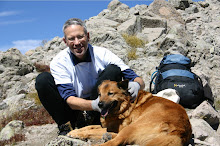Years ago, Pink Floyd released an album that is best known for a song about "the wall." It basically seems to be an all out attack on the educational system of Great Britain, or some caricature of that system. And the theme line was "All in all it's just another brick in the wall." As in many of Pink Floyd's songs, there's an element of despair, a playing with nihilism, as if what is, is, and there's no overcoming of it. The wall is too strong to break through it.
There's a wall in the Western Church. It is created partially by a consumeristic culture that is as strong among Christ followers as it is within people who aren't Christ followers. It is an emotional barrier that confines people to the physical walls of church buildings, majoring on comfort and safety, but avoiding the absolutely essential work of risk and adventure in going to our surrounding neighborhoods, school systems, local governments, block parties, office Christmas parties, soccer games, PTA meetings, and homeless shelters . . . to do and tell Good News to those who will NEVER enter our church buildings, EVER. . . apart from our going. It's a powerful wall that simply must be dismantled, a brick at a time if necessary, to release people into that world.
In line with that, I was reading an artful passage in Michael Frost's piercing book Exiles: Living Missionally in a Post-Christian Culture. A passage in which Michael describes some of the reality of what is going on inside "the wall." Looking through the eyes of those outside the Christian ghetto, people have what Hemingway called a "built-in, shockproof, crap detector." They can spot inauthenticity at 100 yards, and run from it. Even many inside the wall feel it and are increasingly reacting against it. Much of it arises when the primary Christian discourse within the Church concerns itself with happy Christian families, hyper-real images, unlikely expectations, sentimental glow, stunning encounters with God that most of those listening have never had. Frost says, "Perhaps there are many shiny, happy people in church, but those of us who aren't shiny and don't feel perpetually happy eventually develop a strong sense of alientation. We're not able to play the game with any sense of integrity. . . We're left with a sensation of numbness and ache, yearning for something richer, more textured, more real." (Exiles, p.97)
So, how do we get through the wall? By at least this: living as honestly, as vulnerably as we can. By asking our leaders to lead the way in authenticity, honesty, and vulnerability. By openly talking with the people we meet about cancer and fears and weaknesses and brokenness and failures. The very thing we most fear sharing with those who don't follow Christ is the thing that most has the potential to draw them. And to get us through the wall. One brick at a time.
Sunday, December 13, 2009
Tuesday, December 8, 2009
"We Have Cancer"
The totals thus far.. . 3 surgeries, 8 days in the hospital, a million e-mails and phone calls and cards from people all over the world, countless waves of dread, and some sightings of Aslan. (This last image taken from C.S.Lewis' lion in his Narnian Chronicles, one who had strange similarities to Jesus).
The other night in the hospital, we had a meltdown as a family, in which different ones of us heard different things from the same conversation with a doctor. In the aftermath, as we processed what had just happened and whether we could keep it from happening again, Sarah said something like this:
"If we aren't careful, this cancer will tear us apart as a family, and we can't let that happen. Because, you know, it's not just Mom who has cancer. We have cancer."
And just like that, "Aslan" showed up.
On this journey, at this kairos time, in this drama that we are living out, He spoke through Sarah to open our eyes to the fact that cancer has become OUR companion, whether we like it or not.
But Jesus is the far more important companion, in the midst of it all, opening our eyes to what it takes to overcome a grave illness. That is, to name the reality we are in, so that we can face it and, with the grace of God, to put it to rights.
As I write, Susan recovers at home, resting quietly. We are grateful for every prayer, and every pray-er. We await what the next step might be.
The other night in the hospital, we had a meltdown as a family, in which different ones of us heard different things from the same conversation with a doctor. In the aftermath, as we processed what had just happened and whether we could keep it from happening again, Sarah said something like this:
"If we aren't careful, this cancer will tear us apart as a family, and we can't let that happen. Because, you know, it's not just Mom who has cancer. We have cancer."
And just like that, "Aslan" showed up.
On this journey, at this kairos time, in this drama that we are living out, He spoke through Sarah to open our eyes to the fact that cancer has become OUR companion, whether we like it or not.
But Jesus is the far more important companion, in the midst of it all, opening our eyes to what it takes to overcome a grave illness. That is, to name the reality we are in, so that we can face it and, with the grace of God, to put it to rights.
As I write, Susan recovers at home, resting quietly. We are grateful for every prayer, and every pray-er. We await what the next step might be.
Subscribe to:
Posts (Atom)
